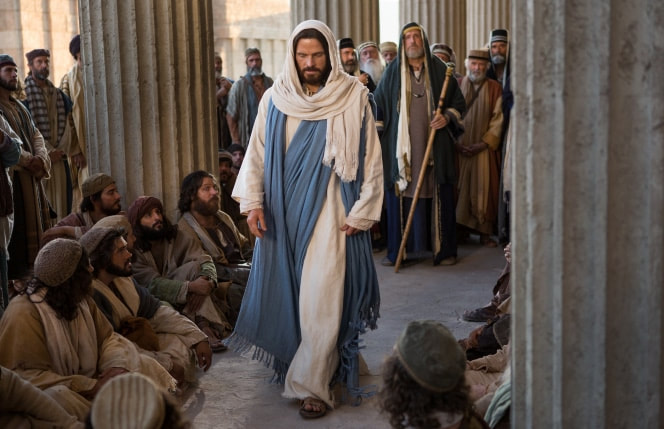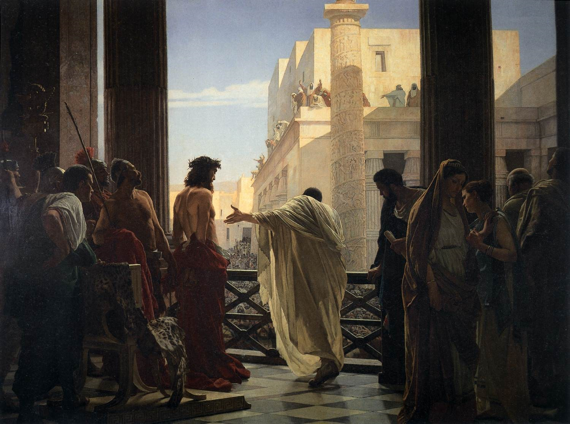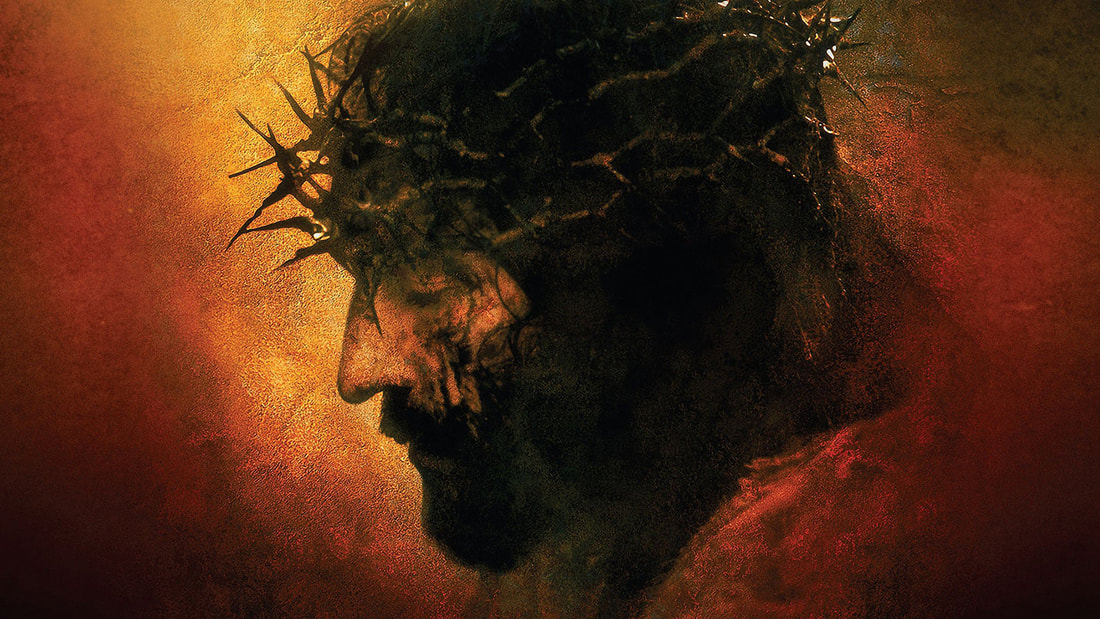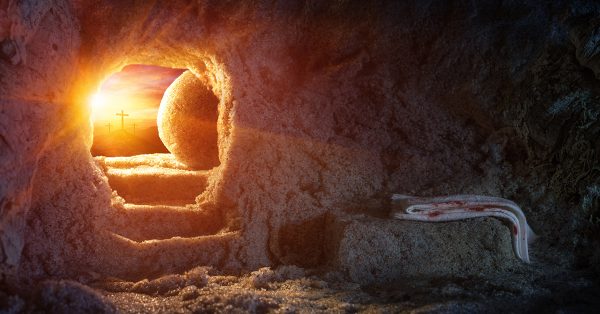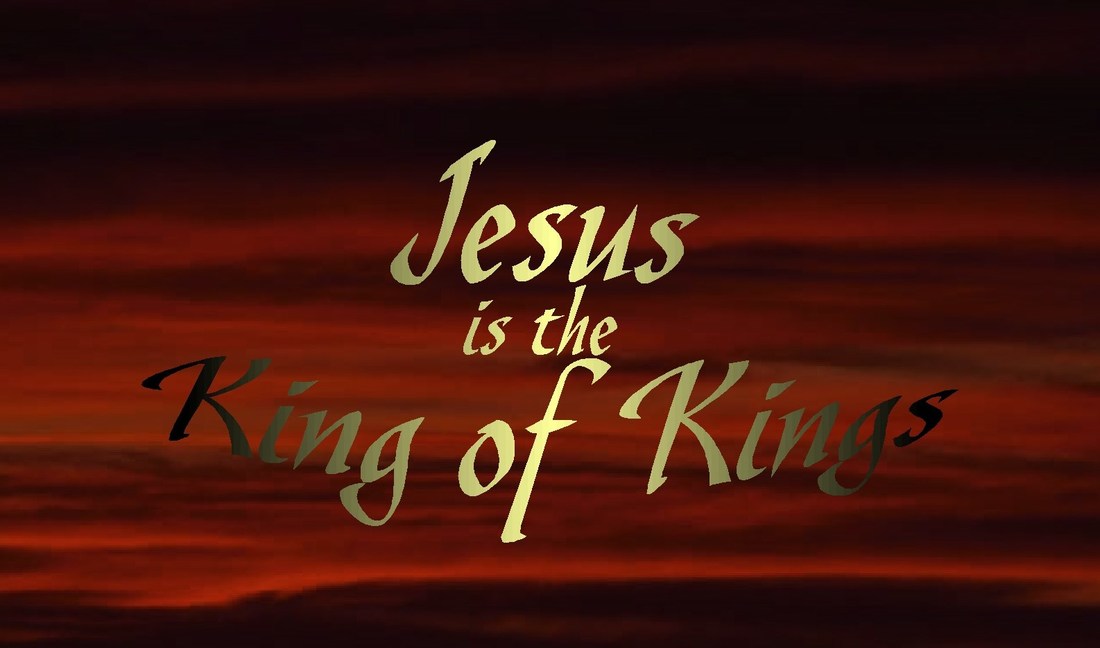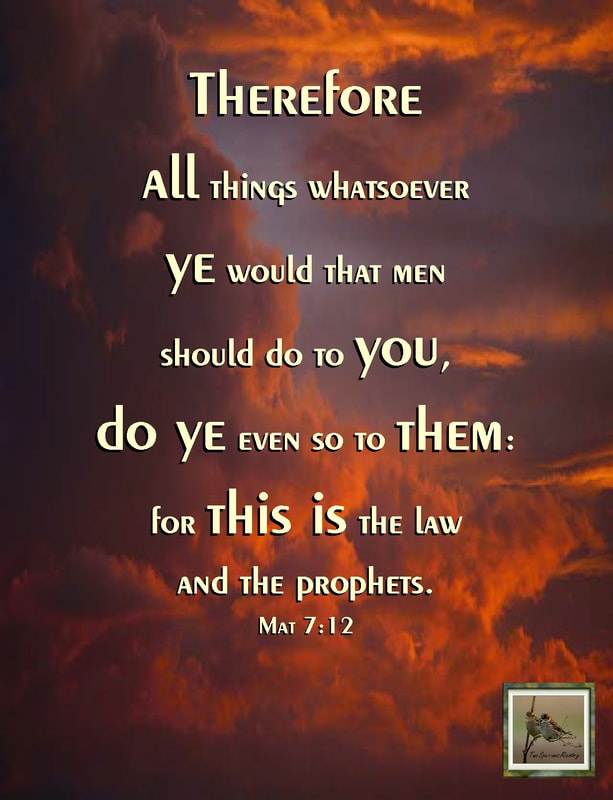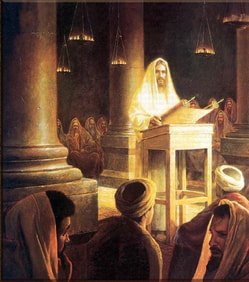
However, in these verses Jesus lays out his calling, his purpose, and to clearly proclaim his mission to the Jewish leaders, and the world; no matter what the reaction would be. His living on earth for 30 years, submitting to his family and growing in knowledge and grace had prepared him for this beginning.
Luk 4:16 And he came to Nazareth, where he had been brought up: and, as his custom was, he went into the synagogue on the sabbath day, and stood up for to read.
Luk 4:17 And there was delivered unto him the book of the prophet Esaias. And when he had opened the book, he found the place where it was written,
Luk 4:18 The Spirit of the Lord is upon me, because he hath anointed me to preach the gospel to the poor; he hath sent me to heal the brokenhearted, to preach deliverance to the captives, and recovering of sight to the blind, to set at liberty them that are bruised,
Luk 4:19 To preach the acceptable year of the Lord.
Luk 4:22 And all bare him witness, and wondered at the gracious words which proceeded out of his mouth. And they said, Is not this Joseph's son?
Luk 4:23 And he said unto them, Ye will surely say unto me this proverb, Physician, heal thyself: whatsoever we have heard done in Capernaum, do also here in thy country.
Luk 4:24 And he said, Verily I say unto you, No prophet is accepted in his own country.
Luk 4:25 But I tell you of a truth, many widows were in Israel in the days of Elias, when the heaven was shut up three years and six months, when great famine was throughout all the land;
Luk 4:26 But unto none of them was Elias sent, save unto Sarepta, a city of Sidon, unto a woman that was a widow.
Luk 4:27 And many lepers were in Israel in the time of Eliseus the prophet; and none of them was cleansed, saving Naaman the Syrian.
Luk 4:28 And all they in the synagogue, when they heard these things, were filled with wrath,
Luk 4:29 And rose up, and thrust him out of the city, and led him unto the brow of the hill whereon their city was built, that they might cast him down headlong.
Luk 4:30 But he passing through the midst of them went his way,
Now, let's take an in-depth look at verses 18 and 19, and what Jesus was doing as he stood there before his piers. The Expositor's Bible commentary gives an excellent detailed account of this dramatic event.
"The Spirit of the Lord is upon Me, Because He anointed Me to preach good tidings to the poor, He hath sent Me to proclaim release to the captives, And recovering of sight to the blind, To set at liberty them that are bruised, To proclaim the acceptable year of the Lord."
Then closing, or rolling up, the book, and handing it back to the attendant, Jesus sat down, and began His discourse. The Evangelist does not record any of the former part of the discourse, but simply gives us the effect produced, in the riveted gaze and the rising astonishment of His auditors, as they caught up eagerly His sweet and gracious words. Doubtless, He would explain the words of the prophet, first in their literal, and then in their prophetic sense; and so far He carried the hearts of His hearers with Him, for who could speak of their Messianic hopes without awakening sweet music in the Hebrew heart? But directly Jesus applies the passage to Himself, and says, "This day is this Scripture fulfilled in your ears," the fashion of their countenance alters; the Divine emphasis He puts upon the ME curdles in their heart, turning their pleasure and wonder into incredulity, envy, and a perfect frenzy of rage. The primary reference of the prophecy seems to have been to the return of Israel from captivity. It was a political Jubilee he proclaimed, when Zion should have a "garland for ashes," when the captive should be free, and aliens should be their servants. But the flowers of Scripture are mostly double; its pictures and parables have often a nearer meaning, and another more remote, or a spiritual, involved in the literal sense. That it was so here is evident, for Jesus takes this Scripture-which we might call a Babylonish garment, woven out of the Exile-and wraps it around Himself, as if it belonged to Himself alone, and were so intended from the very first. His touch thus invests it with a new significance; and making this Scripture a vestment for Himself, Jesus, so to speak, shakes out its narrower folds, and gives it a wider, an eternal meaning. But why should Jesus select this passage above all others? Were not the Old Testament Scriptures full of types, and shadows, and prophecies which testified of him, any one of which He might have appropriated now? Yes, but no other passage so completely answered His design, no other was so clearly and fully declarative of His earthly mission. And so Jesus selected this picture of Isaiah, which was at once a prophecy and an epitome of His own Gospel, as His inaugural message, His manifesto.
(1) as the Gospel of Love;
(2) the Gospel of Light; and
(3) the Gospel of Liberty.
1. The Gospel of Jesus was the Gospel of Love. "He anointed Me to preach good tidings to the poor." That there is a Gospel even in the Old Testament no one will attempt to deny, and able writers have delighted in tracing out the evangelism that, like hidden veins of gold, runs here and there, now embedded deep in historical strata, and now cropping out in the current of prophetical speech. Still, an ear but little trained to harmonies can detect a marvelous difference between the tone of the Old and the tone of the New Dispensation. "Evangelists" is scarcely the name we should give to the prophets and preachers of the Old Testament, if we except that prophet of the dawn, Isaiah. They came, not as the bearers of glad tidings, but with the pressure, the burden of a terrible "woe" upon them. With a voice of threat and doom they call Israel back to the days of fidelity and purity, and with the caustic of biting words they seek to burn out the cancer of national corruption. They were no doves, those old-time prophets, building their nests in the blossoming olives, in soft accents telling of a winter past and a summer near; they were storm-birds rather, beating with swift, sad wings on the crest of sullen waves, or whirling about among the torn shrouds. Even the eremite Baptist brought no evangel. He was a sad man, with a sad message, telling, not of the right which men should do, but of the wrong they should not do, his ministry, like that of the law, being a ministry of condemnation. Jesus, however, announces Himself as the World’s Evangelist. He declares that He is anointed and commissioned to be the bearer of good, glad tidings to man. At once the Morning Star and Sun, He comes to herald a new day; nay, He comes to make that day. And so it was. We cannot listen to the words of Jesus without noticing the high and heavenly pitch to which their music is set. Beginning with the Beatitudes, they move on in the higher spaces, striking the notes of courage, hope, and faith, and at last, in the guest-chamber, dropping down to their key-note, as they close with an eirenicon and a benediction. How little Jesus played upon men’s fears! How, instead, He sought to inspire them with new hopes, telling of the possibilities of goodness, the perfections which were within reach of even the human endeavor! How seldom yon catch the tone of despondency in His words! As He summons men to a life of purity, unselfishness, and faith, His are not the voice and mien of one who commands to a forlorn hope. There is the ring of courage, conviction, certainty about His tone, a hopefulness that was itself half a victory. Jesus was no Pessimist, reading over the grave of departed glories His "ashes to ashes"; He who knew our human nature best had most hopes of it, for He saw the Deity that was back of it and within it.
And just here we touch what we may call the fundamental chord in the Gospel of Jesus, the Fatherhood of God; for though we can detect other strains running through the music of the Gospel, such as the Love of God, the Grace of God, and the Kingdom of God, yet these are but the consonant notes-completing the harmonic scale, or the variations that play about the Divine Fatherhood. To the Hebrew conception of God this was an element altogether new. To their mind Jehovah is the Lord of hosts, an invisible, absolute Power, inhabiting the thick darkness, and speaking in the fire. Sinai thus throws its shadow across the Old Testament Scriptures, and men inhale an atmosphere of law rather than of love.
But what a transformation was wrought in the world’s thought and life as Jesus unfolded the Divine Fatherhood! It altered the whole aspect of man’s relation to God, with a change as marked and glorious as when our earth turns its face more directly to the sun, to find its summer. The Great King, whose will commanded all forces, became the Great Father, in whose compassionate heart the toiling children of men might find refuge and rest. The "Everlasting Arms" were nonetheless strong and omnipotent; but as Jesus uncovered them they seemed less distant, less rigid; they became so near and so gentle, the weakest child of earth might not fear to lay its tired heart upon them. Law was nonetheless mighty, nonetheless majestic, but it was now a transfigured law, all lighted up and suffused with love. No longer was life one round of servile tasks, demanded by an inexorable, invisible Pharaoh; no longer was it a trampled playground, Where all the flowers are crushed, as Fate and Chance take their alternate innings. No; life was ennobled, adorned with new and rare beauties; and when Jesus opened the gate of the Divine Fatherhood the light that was beyond, and that "never was on sea or land," shone through, putting a heavenliness upon the earthly, and a divineness upon the human life. What better, gladder tidings could the poor (whether in spirit or in life) hear than this-that heaven was no longer a distant dream, but a present and most precious reality, touching at every point, and enfolding their little lives; that God was no longer hostile, or even indifferent to them, but that He cared for them with an infinite care, and loved them with an infinite love? Thus did Jesus proclaim the "good tidings"; for love, grace, redemption, and heaven itself are all found within the compass of the Fatherhood. And He who gave to His disciples, in the "Paternoster," a golden key for heaven’s audience-chamber, speaks that sacred name "Father" even amid the agonies of the cross, putting the silver trumpet to His parched and quivering lips, so that earth may hear once again the music of its new and more glorious Jubilee.
In what way shall we interpret these words? Are they to be taken literally, or spiritually? Or are both methods equally legitimate? Evidently they are both intended, for Jesus was the Light-bringer in more senses than one. That the Messiah should signalize His advent by performing wonders and signs, and by working physical cures, was certainly the teaching of prophecy, as it was a fixed and prominent hope in the expectation of the Jews. And so, when the despondent Baptist sent two of his disciples to ask "Art Thou He that should come?" Jesus gave no direct answer, but turning from His questioners to the multitude of sick who pressed around Him, He healed their sick, and gave sight to many that were blind. Then returning to the surprised strangers, He bids them carry back to their master these visible proofs of His Messiahship-how that "lepers are cleansed, and the blind receive their sight." Jesus Himself had a wonderful power of vision. His eyes were Divinely bright, for they carried their own light. Not only had He the gift of prescience, the forward-looking eye; He had what for want of a word we may call the gift of prescience, the eye that looked within, that saw the heart and soul of things. What a strange fascination there was in His very look! How it flashed like a subtle lightning, striking and scathing with its holy indignation the half-veiled meanness and hypocrisy! And how again, like a beam of light, it fell upon Peter’s soul, thawing the chilled heart, and opening the closed fountain of his tears, as an Alpine summer falls on the rigid glacier, and sends it rippling and singing through the lower vales. And had not Jesus an especial sympathy for cases of ophthalmic distress, paying to the blind a peculiar attention? How quickly He responded to Bartimaeus-"What is it that I shall do for thee?"-as if Bartimaeus were conferring the benefit by making his request. Where on the pages of the four Gospels do we find a picture more full of beauty and sublimity than when we read of Jesus taking the blind man by the hand, and leading him out of the town? What moral grandeur and what touching pathos are there! And how that stoop of gentleness makes Him great! No other case is there of such prolonged and tender sympathy, where He not only opens the gates of day for the benighted, but leads the benighted one up to the gates. And why does Jesus make this difference in His miracles, that while other cures are wrought instantly, even the raising of the dead, with nothing more than a look, a word, or a touch, in healing the blind He should work the cure, as it were, in parts, or by using such intermediaries as clay, saliva, or the water of Siloam’s pool? Must it not have been intentional? It would seem so, though what the purpose might be we can only guess. Was it so gradual an inletting of the light, because a glare too bright and sudden would only confuse and blind? Or did Jesus linger over the cure with the pleasure of one who loves to watch the dawn, as it paints the east with vermilion and gold? Or did Jesus make use of the saliva and clay, that like crystal lenses, they might magnify His power, and show how His will was supreme, that He had a thousand ways of restoring sight, and that He had only to command even unlikely things, and light, or rather sight, should be? We do not know the purpose, but we do know that physical sight was somehow a favorite gift of the Lord Jesus, one that He handed to men carefully and tenderly. Nay, He Himself said that the man of Jerusalem had been born blind "that the works of God should be manifest in him"; that is, his firmament had been for forty years darkened that his age, and all coming ages, might see shining within it the constellations of Divine Pity and Divine Power.
But while Jesus knew well the anatomy of the natural eye, and could and did heal it of its disorders, putting within the sunken socket the rounded ball, or restoring to the Optic nerve its lost powers, this was not the only sight He brought. To the companion clauses of this prophecy, where Jesus proclaims deliverance to the captives, and sets at liberty them that are bruised, we are compelled to give a spiritual interpretation; and so "the recovering of sight to the blind" demands a far wider horizon than the literalistic sense offers. It speaks of the true Light which lighteth every man, that spiritual photosphere that environs and enswathes the soul, and of the opening and adjusting of the spiritual sense; for as sight without light is darkness, so light without sight is darkness still. The two facts are thus related, each useless apart from the other, but together producing what we call vision. The recovering of sight to the blind is thus the universal miracle. It is the "Let light be" of the new Genesis, or, as we prefer to call it, the "regeneration." It is the dawn, which, breaking over the soul, broadens unto the perfect day, the heavenly, the eternal noon. Jesus Himself recognizes this binoculism, this double vision. He says, (Joh_16:16) "A little while, and ye behold Me no more; and again a little while, and ye shall see Me," using two altogether different words-the one speaking of the vision of the sense, the other of the deeper vision of the soul. And it was so. The disciples’ vision of the Christ, at least so long as the bodily presence was with them, was the earthly, physical vision. The spiritual Christ was, in a sense, lost, masked in the corporeal. The veil of His flesh hung dense and heavy before their eyes, and not until it was uplifted on the cross, not until it was rent in twain, did they see the mysterious Holy Presence that dwelt within the veil. Nor was the clearer vision given them even now. The dust of the sepulcher was in their eyes, blurring, and for a time half-blinding them-the anointing with the clay. The emptied grave, the Resurrection, was their "pool of Siloam," washing away the blinding clay, the dust of their gross, materialistic thoughts. Henceforth they saw Christ, not, as before, ever coming and going, but as the ever-present, the abiding One. In the fuller light of the Pentecostal flames the unseen Christ became more near and more real than the seen Christ ever was. Seeing Him as visible, their minds were holden, somewhat perplexed; they could neither accomplish much nor endure much; but seeing Him who had become invisible, they were a company of invincibles. They could do and they could endure anything; for was not the I AM with them always?
Now, even in the physical vision there is a wonderful correspondence between the sight and the soul, the prospect and introspect. As men read the outward world they see pretty much the shadow of themselves, their thoughts, feelings, and ideas. In the German fable the traveled stork had nothing to say about the beauty of the fields and wonders of the cities over which it passed, but it could discourse at length about the delicious frogs it had found in a certain ditch. Exactly the same law rules up in the higher vision. Men see what they themselves love and are; the sight is but a sort of projection of the soul. As St. Paul says, "The natural man receiveth not the things of God"; the things which God hath prepared for them that love Him are "things which eye saw not, and ear heard not." And so Jesus gives sight by renewing the soul; He creates around us a new heaven and a new earth, by creating a new, a clean heart within us. Within every soul there are the possibilities of a Paradise, but these possibilities are dormant. The natural heart is a chaos of confusion and darkness, until it turns towards Jesus as its Savior and its Sun, and henceforth revolves around Him in its ever-narrowing circles.
In what sense, then, is Jesus the great Emancipator? It would be easy to show that Jesus, personally, was a lover of freedom. He could not brook restraints. Antiquity, conventionalism, had no charms for Him. Keenly in touch with the present, He did not care to take the cold, clammy hand of a dead Past, or allow it to prescribe His actions. Between the right and the wrong, the good and the evil, He put a wall of adamant, God’s eternal "No"; but within the sphere of the right, the good, He left room for the largest liberties. He observed forms-occasionally, at least-but formalism He could not endure. And so Jesus was constantly coming into collision with the Pharisaic school of thought, the school of routinists, casuists, whose religion was a glossary of terms, a volume of formulas and negations. To the Pharisee religion was a cold, dead thing, a mummy, all enswathed in the cerecloths of tradition; to Jesus it was a living soul within a living form, an angel of grace and beauty, whose wings would bear her aloft to higher, heavenlier spheres, and whose feet and hands fitted her just as well for the common walks of life, in a beautiful, every-day ministry of blessing. And how Jesus loved to give personal liberty to man into remove the restrictions disease had put around their activities, and to leave them physically, mentally free! And what were His miracles of healing but proclamations of liberty, in the lowest sense of that word? He found the human body enfeebled, enslaved; here it was an arm, there an eye, so held in the grip of disease that it was as if dead. But Jesus said to Disease, "Loose that half-strangled life and let it go," and in an instant it was free to act and feel, finding its lesser jubilee. Jesus saw the human mind led into captivity. Reason was dethroned and immured in the dungeon, while the feet of lawless passions were trampling overhead. But when Jesus healed the demoniac, the imbecile, the lunatic, what was it but a mental jubilee, as He gives peace to a distracted soul, and leads banished Reason back to her Jerusalem?
"His grace, His love, His care Are wider than our utmost need, And higher than our prayer."
Yes, verily; and the life that is hid with Christ in God, that, with no side-glances at self, is set apart utterly to do the Divine will, that abandons itself to the perfect keeping of the perfect Savior, will find on earth the "acceptable year of the Lord," its years, henceforth, years of liberty and victory, a prolonged Jubilee.
(Expositor's bible comm)
Rom 5:8 But God commendeth his love toward us, in that, while we were yet sinners, Christ died for us.
The Gospel of Jesus Christ
1Co 15:1 Moreover, brethren, I declare unto you the gospel which I preached unto you, which also ye have received, and wherein ye stand;
1Co 15:2 By which also ye are saved, if ye keep in memory what I preached unto you, unless ye have believed in vain.
1Co 15:3 For I delivered unto you first of all that which I also received, how that Christ died for our sins according to the scriptures;
1Co 15:4 And that he was buried, and that he rose again the third day according to the scriptures:
1Co 15:5 And that he was seen of Cephas, then of the twelve:
1Co 15:6 After that, he was seen of above five hundred brethren at once; of whom the greater part remain unto this present, but some are fallen asleep.
1Co 15:7 After that, he was seen of James; then of all the apostles.
1Co 15:8 And last of all he was seen of me also, as of one born out of due time.
1Co 15:9 For I am the least of the apostles, that am not meet to be called an apostle, because I persecuted the church of God.
1Co 15:10 But by the grace of God I am what I am: and his grace which was bestowed upon me was not in vain; but I laboured more abundantly than they all: yet not I, but the grace of God which was with me.
1Co 15:11 Therefore whether it were I or they, so we preach, and so ye believed.
Rom 10:9 That if thou shalt confess with thy mouth the Lord Jesus, and shalt believe in thine heart that God hath raised him from the dead, thou shalt be saved.
Rom 10:10 For with the heart man believeth unto righteousness; and with the mouth confession is made unto salvation.
